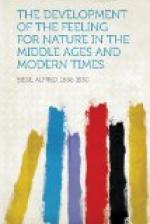In subjectivity and dreaminess both Chateaubriand and Lamartine were like the German romanticists, but their fundamental note was theism, not pantheism. The storm of the French Revolution, which made radical changes in religion, as in all other things, was followed by a reaction. Christianity acquired new power and inwardness, and Nature was unceasingly praised as the mirror of the divine idea of creation.
In his Genie du Christianisme, Chateaubriand said:
The true God, in entering
into His Works, has given his immensity
to Nature... there is an instinct
in man, which puts him in
communication with the scenes
of Nature.
Lamartine was a sentimental dreamer of dreams, a thinker of lofty thoughts which lost themselves in the inexpressible. His Meditations shew his ardent though sad worship of Nature; his love of evening, moonlight, and starlight. For instance, L’Isolement:
Ici gronde le fleuve aux vagues ecumantes,
Il serpente et s’enfonce en un lointain
obscur:
La le lac immobile etend ses eaux dormantes
Oo l’etoile du soir se leve dans
l’azur.
An sommet de ces monts couronnes de bois
sombres,
Le crepuscule encore jette un dernier
rayon;
Et le char vaporeux de la reine des ombres
Monte et blanchit deja les bords de l’horizon.
Le Soir:
Le soir ramene le silence....
Venus se leve a l’horizon;
A mes pieds l’etoile amoureuse
De sa lueur mysterieuse
Blanchit les tapis de gazon.
De ce hetre au feuillage sombre
J’entends frissonner les rameaux;
On dirait autour des tombeaux
Qu’on entend voltiger une ombre,
Tout-a-coup, detache des cieux,
Un rayon de l’astre nocturne,
Glissant sur mon front taciturne,
Vient mollement toucher mes yeux.
Doux reflet d’un globe de flamme
Charmant rayon, que me veux-tu?
Viens-tu dans mon sein abattu
Porter la lumiere a mon ame?
Descends-tu pour me reveler
Des mondes le divin mystere,
Ces secrets caches dans la sphere
Ou le jour va te rappeler?
In the thought of happy past hours, he questions the lake:
Un soir, t’en souvient-il, nous
voguions en silence;
On n’entendait au loin, sur l’onde
et sous les cieux,
Que le bruit des rameurs qui frappaient
en cadence
Tes flots harmonieux.
O lac! rochers muets! grottes! foret obscure!
Vous que le temps epargne ou qu’il
peut rajeunir
Gardez de cette nuit, gardez, belle nature,
Au moins le souvenir!...
Que le vent qui gemit, le roseau qui soupire
Que les parfums legers de ton air embaume,
Que tout ce qu’on entend, l’on
voit, ou l’on respire,
Tout dise: ’ils out aimes!
La Priere has:




